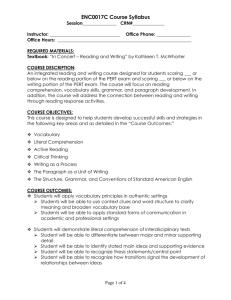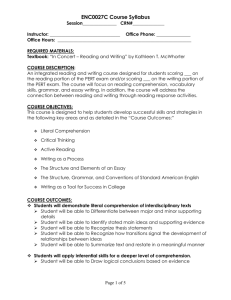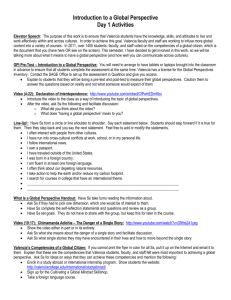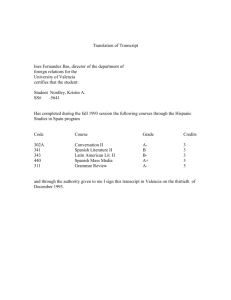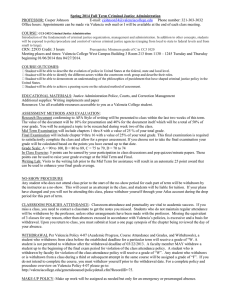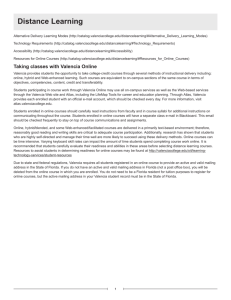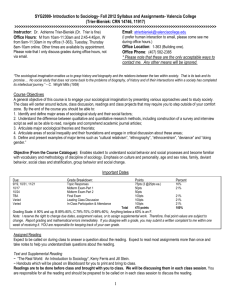Survey of Mass Communications (MMC 1000)
advertisement
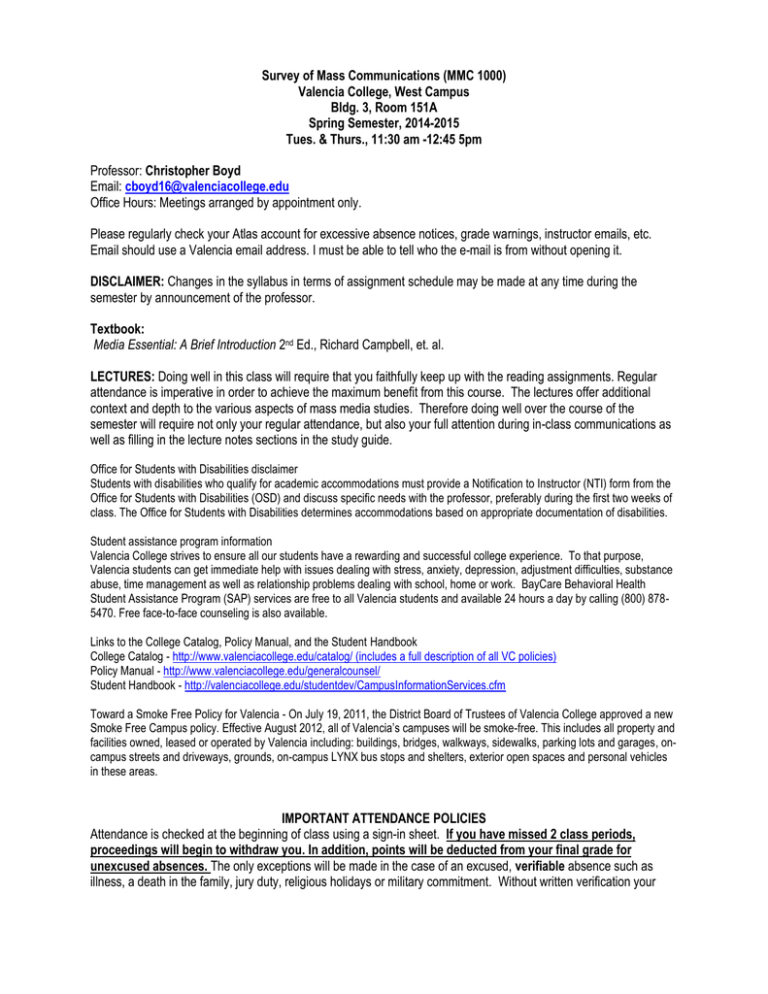
Survey of Mass Communications (MMC 1000) Valencia College, West Campus Bldg. 3, Room 151A Spring Semester, 2014-2015 Tues. & Thurs., 11:30 am -12:45 5pm Professor: Christopher Boyd Email: cboyd16@valenciacollege.edu Office Hours: Meetings arranged by appointment only. Please regularly check your Atlas account for excessive absence notices, grade warnings, instructor emails, etc. Email should use a Valencia email address. I must be able to tell who the e-mail is from without opening it. DISCLAIMER: Changes in the syllabus in terms of assignment schedule may be made at any time during the semester by announcement of the professor. Textbook: Media Essential: A Brief Introduction 2nd Ed., Richard Campbell, et. al. LECTURES: Doing well in this class will require that you faithfully keep up with the reading assignments. Regular attendance is imperative in order to achieve the maximum benefit from this course. The lectures offer additional context and depth to the various aspects of mass media studies. Therefore doing well over the course of the semester will require not only your regular attendance, but also your full attention during in-class communications as well as filling in the lecture notes sections in the study guide. Office for Students with Disabilities disclaimer Students with disabilities who qualify for academic accommodations must provide a Notification to Instructor (NTI) form from the Office for Students with Disabilities (OSD) and discuss specific needs with the professor, preferably during the first two weeks of class. The Office for Students with Disabilities determines accommodations based on appropriate documentation of disabilities. Student assistance program information Valencia College strives to ensure all our students have a rewarding and successful college experience. To that purpose, Valencia students can get immediate help with issues dealing with stress, anxiety, depression, adjustment difficulties, substance abuse, time management as well as relationship problems dealing with school, home or work. BayCare Behavioral Health Student Assistance Program (SAP) services are free to all Valencia students and available 24 hours a day by calling (800) 8785470. Free face-to-face counseling is also available. Links to the College Catalog, Policy Manual, and the Student Handbook College Catalog - http://www.valenciacollege.edu/catalog/ (includes a full description of all VC policies) Policy Manual - http://www.valenciacollege.edu/generalcounsel/ Student Handbook - http://valenciacollege.edu/studentdev/CampusInformationServices.cfm Toward a Smoke Free Policy for Valencia - On July 19, 2011, the District Board of Trustees of Valencia College approved a new Smoke Free Campus policy. Effective August 2012, all of Valencia’s campuses will be smoke-free. This includes all property and facilities owned, leased or operated by Valencia including: buildings, bridges, walkways, sidewalks, parking lots and garages, oncampus streets and driveways, grounds, on-campus LYNX bus stops and shelters, exterior open spaces and personal vehicles in these areas. IMPORTANT ATTENDANCE POLICIES Attendance is checked at the beginning of class using a sign-in sheet. If you have missed 2 class periods, proceedings will begin to withdraw you. In addition, points will be deducted from your final grade for unexcused absences. The only exceptions will be made in the case of an excused, verifiable absence such as illness, a death in the family, jury duty, religious holidays or military commitment. Without written verification your absence will not be excused. Emails or phone calls either in advance or after the absence does not constitute as verification of an excused absence. College-wide Withdrawal Policy: Per Valencia Policy 4-07 (Academic Progress, Course Attendance and Grades, and Withdrawals), a student who withdraws from class before the established deadline for a particular term will receive a grade of “W. A student is not permitted to withdraw after the withdrawal deadline of March 27. A faculty member will withdraw a student up to the beginning of the final exam period for violation of the class attendance policy. A student who is withdrawn by faculty for violation of the class attendance policy will receive a grade of “W”. Any student who withdraws or is withdrawn from a class during a third or subsequent attempt in the same course will be assigned a grade of “F.” If you do not intend to complete the course, you must withdraw yourself prior to the withdrawal date. Review the complete policy at http://valenciacollege.edu/generalcounsel/policydetail.cfm?RecordID=75 No-Show Procedure. Failure to show up for a class meeting by Jan. 20 will result in the student being withdrawn from the class ABSENCES: Absences or failures to meet assignments are not excusable because of work schedules or related activities. Notes from supervisors or parents will not be accepted as excuses. ARRIVING LATE: Be in class on time. Arrival later than 15 minutes into the class will be counted as an absence and you will not be permitted to attend the class. If you are late, quietly make your way to a seat. After class, inform me that you were here (otherwise you will be counted as absent.) You will be allowed to be late 2 times without a penalty. After the third infraction all late arrivals will be counted as an absence. EARLY DEPARTURE: If you leave during class you will not be allowed in unless you must leave for medical reasons that are cleared with me before the start of class. ELECTRONIC DEVICES: All electronic devices, with the exception of voice recorders, must be turned off once class has begun. There will be no text messaging or web browsing during class. ACADEMIC HONESTY: Each student is expected to be in complete compliance with the college policy on academic honesty as set forth in the student handbook. Plagiarism or cheating will be dealt with severely. It can result in failing this class or even dismissal from Valencia College. I reserve the right to collect all materials used in the preparation and delivery of all speeches. WRITTEN ASSIGNMENTS: Unless otherwise noted all written assignments must be typed: Double-spaced, 12 point font. All work turned in hand written will receive a zero. All written assignments with multiple pages must be stapled together, otherwise they will not be accepted. All written assignments must be provided through a hard copy. Attachments sent via e-mail will not be accepted. All written assignments must be turned in at the beginning of the class period on the date it is due. Work turned in to my office will not be accepted. In addition, computer or printer failure is not an acceptable excuse for late work THE COURSE: MMC 1000 is a three credit elective course toward an Associates in Arts degree and for many Associates in Science programs. There are no pre-requisites. MMC 1000 is an introduction to history, development and current practices of media of mass communication. Presents functions of newspapers, magazines, radio, television, and advertising in light of responsibilities to public. In addition to this course will reinforce the following competencies wholly or partially. THINK To Think, what must you do? a. Analyze data, ideas, patterns, principles, perspectives b. Employ the facts, formulas, procedures of the discipline c. Integrate ideas and values from different disciplines d. Draw well-supported conclusions e. Revise conclusions consistent with new observations, interpretations, or reasons How and Where You Must Think? -With curiosity and consistency -Individually and in groups COMMUNICATE To communicate, what must you do? a. Identify your own strengths and need for improvement as a communicator b. Employ methods of communication appropriate to audience and purpose c. Evaluate the effectiveness of your own and others’ communication How and Where You Must Communicate? -By speaking, listening, reading, and writing -Verbally, non-verbally, and visually -With honesty and civility -In different disciplines and settings Deadline to withdraw with a W Spring Break VALUE To Value, What Must You Do? a. Recognize values as expressed in attitudes, choices, and commitments b. Distinguish among personal, ethical, aesthetic, cultural, and scientific values c. Employ values and standards of judgments from different disciplines d. Evaluate your own and others’ values from individual, cultural, and global perspectives e. Articulate a considered and self-determined set of values How and Where Must You value? -With empathy and fair-mindedness -Individually and in groups ACTS To Act, what must you do? a. Apply disciplinary knowledge, skills, and values to education and career goals b. Implement effective problem-solving, decision-making, and goal-setting strategies c. Act appropriately and effectively in various personal and professional settings d. Respond appropriately to changing circumstances How and where must you value? -With courage and perseverance -Individually and in groups -In your personal, professional, and community life IMPORTANT DATES March 21 March 9-13 FINAL EXAM: Important, if you fail to take the final exam at this time you will receive an F for your semester grade. Tuesday, April 28 11:30 am to 12:45 pm GRADING & FINAL EXAMINATION Chapter Quizzes: Unannounced Final Project Approval: March 24 Final Project, Turning It In: April 7 Final Exam: April 28 The Study Guide: Rather than give you entire chapters for you to read by a certain date I have provided a Study Guide for your reading assignments. Sections of the Study Guide will be provided to you or posted in Blackboard throughout the semester. The guide allows you to search for information that is key to understanding material contained in the textbook. Here is how the Study Guide will work: Below is an example of a passage from the Study Guide. Page 3: Engaging with media isn’t just a leisure activity________________________________________ What you will need to do is to page 3 in the textbook find the sentence then fill in the rest of the sentence. Quizzes based on the Study Guide. Once we have finished covering a chapter there will be a pop quiz covering that chapter. You will not be given warning for this quiz. The quiz will be at the beginning of the class period. There will be a 20 minute time limit for each quiz. If you are late you will have less than 20 minutes. If you arrive for class after the 20 minute quiz period you will have missed the quiz and receive a zero. There are no make-ups for the quizzes. Each question from the quiz will be taken directly from the Study Guide. During the quiz you are allowed to use your Study Guide or in-class notes but you are NOT allowed to use your textbook. Final Exam: The questions on the final exam will be based on the Study Questions at the end of each chapter. I will give you advanced notice which questions you will need to study. Your answers will be written in the Blue Testing Booklets available in the Book Store and the vending machine outside the library. Final: Tuesday, April 28. 11:30 am-12:45 pm Important: FAILURE TO BE IN CLASS ON THIS DATE AT THIS TIME WILL RESULT IN AN “F”. Final Project: Your final project must be related to Mass Media. This project could be a paper on some mass media topic. It could be a podcast or short video. It could be an Internet project related to a blog, webpage, etc. You must get approval for your project by Tuesday, March 24. The project will be due by Tuesday, April 7. Grade Breakdown: Attendance: 15 points (reduced 5 points per unexcused absence) 5 Quizzes: 50 points @ 10 points each Final exam: 15 points Final project: 20 points GRADING SCALE 90-100%=A, 80-89.99%=B, 70-79.99%=C, 60-69.99%=D, 0-59.99%=F
